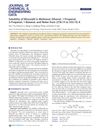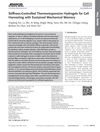 24 citations,
May 2019 in “PLOS ONE”
24 citations,
May 2019 in “PLOS ONE” The African spiny mouse can fully regenerate its muscle without scarring, unlike the common house mouse.
 24 citations,
January 2019 in “Science China Life Sciences”
24 citations,
January 2019 in “Science China Life Sciences” Chitosan/LiCl composite scaffolds help heal deep skin wounds better.
 24 citations,
October 2017 in “Biomolecules”
24 citations,
October 2017 in “Biomolecules” Some growth factors, while important for normal body functions, can cause diseases when not regulated properly.
 24 citations,
March 2015 in “Dermatologic Surgery”
24 citations,
March 2015 in “Dermatologic Surgery” Home-use cosmetic laser and light devices show modest results for hair removal and acne treatment, but more research is needed for confirmation.
 24 citations,
August 2013 in “Facial Plastic Surgery Clinics of North America”
24 citations,
August 2013 in “Facial Plastic Surgery Clinics of North America” Hair restoration surgery can have complications; success depends on patient education, careful planning, and proper execution.
 24 citations,
January 2012 in “Journal of Cellular Biochemistry”
24 citations,
January 2012 in “Journal of Cellular Biochemistry” C-reactive protein helps monocytes stick to blood vessel cells by causing oxidative stress.
 24 citations,
April 2011 in “Journal of Chemical & Engineering Data”
24 citations,
April 2011 in “Journal of Chemical & Engineering Data” Minoxidil dissolves best in methanol and least in water.
 24 citations,
January 2011 in “International Journal of Trichology”
24 citations,
January 2011 in “International Journal of Trichology” Light microscopy is useful for diagnosing different hair disorders.
 24 citations,
July 1994 in “Molecular Endocrinology”
24 citations,
July 1994 in “Molecular Endocrinology” Researchers found an RNA transcript that might help control a growth factor linked to tumor development.
 23 citations,
March 2019 in “Journal of Essential Oil Research”
23 citations,
March 2019 in “Journal of Essential Oil Research” Rosemary's antioxidant content changes with the climate and season.
 23 citations,
September 2018 in “Dermatologic Therapy”
23 citations,
September 2018 in “Dermatologic Therapy” Microneedling is a safe and effective way to improve various skin conditions with minimal side effects.
 23 citations,
January 2018 in “Elsevier eBooks”
23 citations,
January 2018 in “Elsevier eBooks” Nanoemulsions improve stability and delivery of active ingredients in cosmetics for skin and hair care.
 23 citations,
June 2017 in “Drug Design Development and Therapy”
23 citations,
June 2017 in “Drug Design Development and Therapy” Cyclodextrins improve finasteride's solubility and bioavailability for hair loss treatment.
 23 citations,
January 2017 in “Journal of Oleo Science”
23 citations,
January 2017 in “Journal of Oleo Science” Supercritical CO2 extraction makes rice bran oil healthier and safer than traditional methods.
 23 citations,
September 2015 in “International Journal of Molecular Medicine”
23 citations,
September 2015 in “International Journal of Molecular Medicine” Activating ER-β, not ER-α, improves skin cell growth and wound healing.
 23 citations,
June 2015 in “Journal of Tissue Engineering and Regenerative Medicine”
23 citations,
June 2015 in “Journal of Tissue Engineering and Regenerative Medicine” Wnt1a helps keep cells that can grow hair effective for potential hair loss treatments.
 23 citations,
December 2012 in “ChemistryOpen”
23 citations,
December 2012 in “ChemistryOpen” Probe detects finasteride with high selectivity and low detection limit.
 23 citations,
June 2012 in “PLOS ONE”
23 citations,
June 2012 in “PLOS ONE” KLF4 is important for maintaining skin stem cells and helps heal wounds.
 23 citations,
March 2010 in “Medical hypotheses”
23 citations,
March 2010 in “Medical hypotheses” Merkel cells may have roles in sensing magnetic fields, creating fingerprints, Reiki energy healing, passing on environmental information to offspring, and influencing hair shape.
 23 citations,
May 2009 in “International Journal of Dermatology”
23 citations,
May 2009 in “International Journal of Dermatology” AR gene not major factor in female hair loss; different from male hair loss.
 23 citations,
March 2001 in “Clinics in Dermatology”
23 citations,
March 2001 in “Clinics in Dermatology” Hair restoration surgery techniques have evolved, with focus on patient selection and realistic goals, and future advancements may include cloning and gene therapy.
 23 citations,
March 1989 in “The Veterinary clinics of North America. Food animal practice”
23 citations,
March 1989 in “The Veterinary clinics of North America. Food animal practice” Llamas often have skin issues like mange, bacterial infections, and allergies, with some treatable by zinc.
 22 citations,
May 2021 in “Nature Communications”
22 citations,
May 2021 in “Nature Communications” Tissue stiffness affects hair follicle regeneration, and Twist1 is a key regulator.
 22 citations,
October 2020 in “Frontiers in Cell and Developmental Biology”
22 citations,
October 2020 in “Frontiers in Cell and Developmental Biology” Fisetin, a type of polyphenol, may help hair grow by increasing certain protein activities in cells.
 22 citations,
March 2020 in “Cosmetics”
22 citations,
March 2020 in “Cosmetics” Nanotechnology improves minoxidil treatment for hair loss.
 22 citations,
October 2019 in “International Journal of Nanomedicine”
22 citations,
October 2019 in “International Journal of Nanomedicine” The nanoparticles improved hair growth and enlarged hair bulbs.
 22 citations,
September 2019 in “ACS omega”
22 citations,
September 2019 in “ACS omega” The new nanocomposite films are stronger, protect against UV, speed up wound healing, and are antibacterial without being toxic.
 22 citations,
August 2019 in “Environmental research”
22 citations,
August 2019 in “Environmental research” Pseudomonas sp. T5-6-I bacteria increase selenium uptake in Brassica oleracea plants by 130%.
 22 citations,
January 2017 in “Advanced Healthcare Materials”
22 citations,
January 2017 in “Advanced Healthcare Materials” The hydrogels help harvest cells while preserving their mechanical memory, which could improve wound healing.
 22 citations,
September 2015 in “Clinical lymphoma myeloma & leukemia/Clinical lymphoma, myeloma and leukemia”
22 citations,
September 2015 in “Clinical lymphoma myeloma & leukemia/Clinical lymphoma, myeloma and leukemia” Recognizing and treating skin symptoms in essential thrombocythemia is crucial for patient quality of life.






























